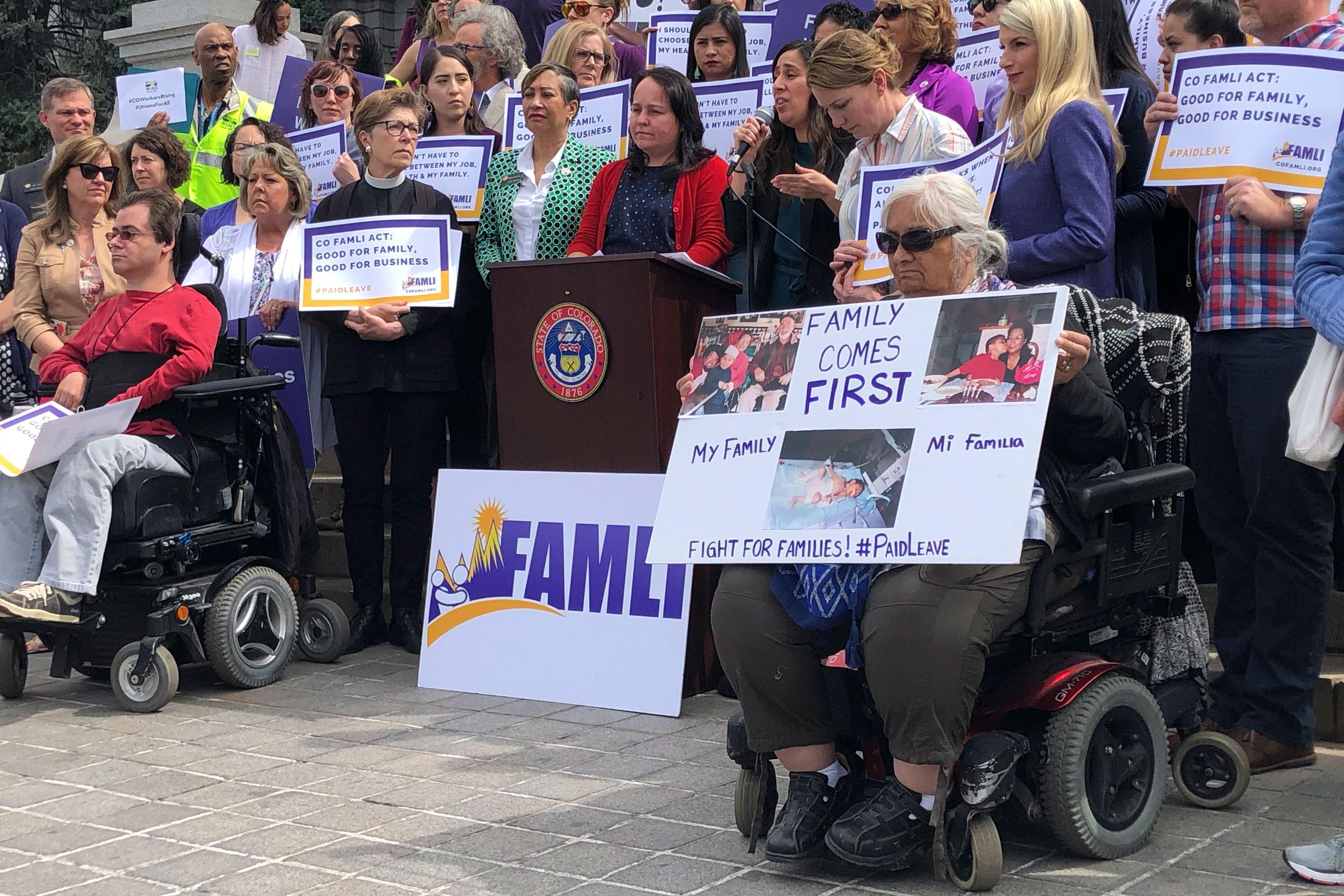
A Democratic proposal to require companies to provide paid family leave for their workers just lost two of its four main sponsors. It's a blow to one of the most hard-fought bills of this legislative session.
Sen. Angela Williams of Denver said that she dropped her name from the bill because she was “struggling with many of the details” following major revisions.
“This bill in its current form does not deliver a benefit to the vast majority who tend to work in low-wage jobs that often lack stability,” she wrote in a text message to CPR News.
Rep. Monica Duran of Jefferson County also has dropped her name but wasn’t immediately available for comment.
Westminster's Sen. Faith Winter has been one of the faces of the bill. She learned Duran and Williams were leaving through a Sunday night phone call, she said.
She was initially distraught, reportedly telling The Denver Post on Monday morning that she had “failed Coloradans.” But by afternoon she seemed to recover her poise and said she would try again to rally her party around the measure.
“It is difficult to pass a bill like this because it impacts every Coloradan,” she said. “And because it impacts all Coloradans, it means that everyone has an interest in it.”
Political calculus
Winter originally expected to co-sponsor the bill along with Williams, Duran and Rep. Matt Gray of Broomfield. But the alliance fractured following a major rewrite and resistance from other Democrats.
The sponsors originally aimed to create a government-run program, which they termed “social insurance.” The billion-dollar program would have reimbursed a portion of workers’ wages when they needed time off for childbirth and family medical emergencies. It would have been funded by a mandatory fee collected from both employers and workers.
Gov. Jared Polis signaled he wouldn’t support that model, and Winter said she was concerned about building enough support among Democratic senators and representatives too — so they tried to craft a compromise.
The rewritten bill would still require many companies to provide paid leave. But it wouldn’t create a public fund to pay for it. Instead, companies could buy private insurance policies to cover workers’ time-off wages.
“These compromises were something made to make sure this bill could pass,” Winter said earlier. “We worked really hard to make this accessible and affordable to as many workers as we can.”
Public or private?
The change drew skepticism from groups that favored the social model. Some worried the private mandate wouldn’t be as effective in guaranteeing time off for lower-wage workers.
The draft bill excluded seasonal workers — an “unfortunate” concession to the ski and farm industries, Winter said. She also met opposition because of the bill’s approach to medical emergencies. It would allow time off to care for close family members, but immigrant and LGBT advocates wanted a broader definition of who qualified as “family.”
And then there was the overriding criticism: A private mandate profits private insurance companies.
“Private insurance, by definition, their goal is to generate a profit. Well, that profit has to come from somewhere,” said Debra Brown, executive director of the advocacy group Good Business Colorado. “That’s going to manifest in an incentive to deny claims.”
Low-income workers would fare worse, she argued, because they’re less able to fight for their rights. Brown argued that the public model is the proven approach, backed by a lengthy state-backed study. It’s also similar to how eight other states and Washington, D.C. have set up their paid leave programs. (New York has a hybrid model, though.)
Winter acknowledged that she prefers the public model too, but she argued that the private approach would have safeguards.
The bill as drafted would set caps on insurance premiums. Insurance companies would have incentives to take on costlier industries, such as education, where people are more likely to need leave. And it covered a higher portion of wages for lower-income workers, known as “progressive” wage replacement.
The concept of mandatory paid family leave also faced resistance from legislative Republicans, and from business leaders, though some said they preferred the private model’s flexibility.
Another option
The sponsors had planned to introduce the rewritten bill this week. It’s now unclear whether it will ever see the light of day. Democrats hold a 19-16 majority in the Senate, and with Republicans solidly opposed to the idea, the sponsors can’t afford a splintering in their ranks.
“It’s on the verge of falling apart, but I think they’re going to keep working on it,” said Democratic Sen. Dominick Moreno of Commerce City, who wasn’t among the sponsors.
There’s another option: A group called Colorado Families First said In January that it has $500,000 available for an effort to put the topic on the ballot. “So if the legislature can’t get it done, we are ready to,” said Lynea Hansen, a consultant working on the campaign, shortly after the announcement.
The proposal is still going through the approval process before it can start to collect signatures. It would stick to the Democrats’ original idea, setting up a publicly-run benefit similar to what’s offered by California and a few other states.
Brown said that she wants to see Gov. Jared Polis get involved in the conversation since his opposition helped to reshape the original bill. The governor’s office said that paid leave is “priceless” and he’s “committed” to the idea.
“The governor appreciates the work to this point and is hopeful a bill that works for workers, businesses both small and large, and that is fiscally responsible for the state moves forward this year. Gov. Polis appreciates the tireless work of the bill sponsors to strike this important balance and looks forward to the work ahead,” wrote spokesperson Conor Cahill.
Kjersten Forseth, political director for the AFL-CIO union, said that her group still wants to see a bill this year, whether it’s the public or private model.
“A bill is never finished until it’s gone through the final chamber,” she said.









